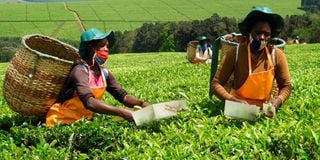Exposé of sexual abuses in tea firms call for thorough probe

Workers pick tea at a plantation Kericho County. Investigation reports in the wake of the BBC’s revelations of rights abuse in tea farms reveal that both women and men have been abused.
What you need to know:
- Businesses have a responsibility to respect human rights by complying with relevant laws.
- Sexual abuse of female workers on tea farms is a common problem that has also been reported in Malawi and India.
Follow-up investigative reports in the wake of the BBC’srevelations of sexual exploitation on James Finlay and Ekaterra tea farms have revealed that both women and men have been abused.
While the former were sexually exploited, the latter have been exposed to excruciating semi-mechanised work, forcing many to resort to using cannabis as an anticipatory painkiller and energiser. The use of harvesting machines was reported to have also “led to emission of smoke and noise”, thus compromising the health of workers. Such exposure is particularly harmful to men by virtue of their domination of mechanised tasks.
The reports by Daily Nation’s Anita Chepkoech and Vitalis Kimutai detail that male workers chained to the 12kg machines that they pull through the farm and which weigh 60kg when full, have lost libido and sensation around their waists. Thus, they require constant physiotherapy and have to wear orthopaedic belts to manage the pain attributed to “carrying heavy loads and assuming a stooping posture for hours daily”.
Loss of libido is particularly depressing, given that sexual dysfunction is the ultimate failure for men. Logically, this has led to broken families, an eventuality that not only disadvantages the men but also their wives, children, communities and society. If the social, cultural and psychological consequences are to be quantified, the victims deserve hefty financial compensation.
The consequences of sexual abuse for the women include; discomfort and stress at work; decline in productivity; infection with life-threatening diseases; unwanted pregnancies followed by abortions; loss of dignity; violence from cuckolded husbands; broken marriages; residual exploitation leading to syndromisation; trauma; and stigma.
The cases of abuse at hand are prime examples of how institutions can perpetrate gender-based violence. In this regard, the United Nations Guiding Principles on Business and Human Rights come to mind. Endorsed by the UN Human Rights Council on June 16, 2011, the principles provide a standard for preventing and addressing human rights abuses emanating from business activity.
Although they do not have the force of law, the principles have moral authority. They require the state to protect workers by ensuring businesses do not interfere with enjoyment of human rights, investigating alleged abuses and punishing culpable entities. Thus, the State should have intervened on the reported hazardous work, risky working conditions and sexual harassment. To the extent that it did not, the state is guilty of violating the workers’ rights.
Human rights
Businesses have a responsibility to respect human rights by complying with relevant laws and bearing in mind the cultures, environments, needs and aspirations of the communities in which they operate. This obligation is grounded on the principle of social licence, that businesses will behave responsibly. This is expected regardless of the state’s own performance on human rights and whether or not it investigates the abuses. States can also require businesses to file reports on compliance with human rights principles and standards.
Both the State and businesses are expected to provide access to remedy for the affected. Such include apologies, restitution, rehabilitation, financial or other compensation, punitive sanctions and restraint from future harm.
If the allegations on the farms are true, then the companies have perpetrated an array of human rights abuses. Sexual harassment and having men work under hazardous conditions are tantamount to slavery and cruel, inhuman and degrading treatment. The rights to health and life are compromised by exposure of women and, by extension their husbands, to sexually transmitted diseases and lifelong impairments due to the use of debilitating machines.
Threatening workers
By coercing women into sex in exchange for jobs, the supervisors compromised the principle of non-discrimination. Restricting affected workers to seeking health services from a specific facility tramples the right of choice. Threatening workers who complain with dismissal is an interference with the freedom of expression and the right to work and remedy.
Besides the personal and professional consequences of sexual abuse on workers, the vice also has direct and indirect costs to involved companies. These include: loss of reputation, brand value and markets; heavier insurance premiums; legal expenses; wastage of time; financial compensation to victims; loss of clients and associates; avoidance by top talent; and staff turnover hence perpetual expenditure on recruitment.
Malawi and India
Sexual abuse of female workers on tea farms is a common problem that has also been reported in Malawi and India. It is not enough for companies to claim that they have safeguards. The same must be implemented and transgressors sanctioned. It is also rather contradictory to expect individuals perpetrating the abuses to implement the safeguards.
Defenders of human rights must hope that the current cases are comprehensively investigated, adequate remedies given to victims and culpable entities appropriately punished.
Dr Miruka is an international gender and development consultant and scholar ([email protected])





